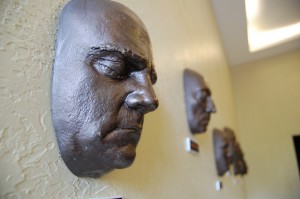
We live in a society of masks. We wear masks when we are around others, wanting them to have a positive view of us.
I knew all about this when I sang in choir in high school. When I was going to be performing a solo at a concert, I would practice for weeks. I would have knots in my stomach and my legs would quake as the concert would approach; I couldn’t miss a note lest others think less of me. My mask was perfectionism, and it was constricting at times.
But, when I would walk home from school each day, I would belt various songs, never remembering all the verses or words, simply enjoying the act of singing.
This image of wearing masks is one that is commonly used, perhaps even cliché. And, of course, the correct response is to say, “Let’s take off our masks. Let’s be who we really are.”
And yet it is hard to do so in daily life.
Perhaps the most innocuous mask we wear is when we so automatically say we are doing well when we greet each other.
“Hey!” “Hey! How’s it going?” “Pretty good. How ‘bout you?” “Good.” And then we go our separate ways.
A question I’ve started asking lately when I really want to be able to take off masks instead of “How’s it going?” is “How can I pray for you?” This question is so fundamentally different. When we ask “How’s it going?” we may seem formulaic, duty-bound by social conventions to ask this question, and we respond in the same automatic, expected way.
When we ask “What can I be praying for you about?” we communicate that not everything has to be going well. We want to listen. We want to be present. We want to be there for one another.
Sometimes I imagine what our campus would look like if everyone were to wear a name tag each day. Instead of a name though, this name tag would say “Today, I need ___________.” We would fill it each day (or throughout the day) with what we need. On some days, my name tag would read “someone to listen to me,” “someone to share my good news with,” “someone to share their excitement with me,” or even just “a hug.”
We all need something, and we are “pretty good” far less often than we tell each other.
What if we were to take off our masks and wear name tags instead?